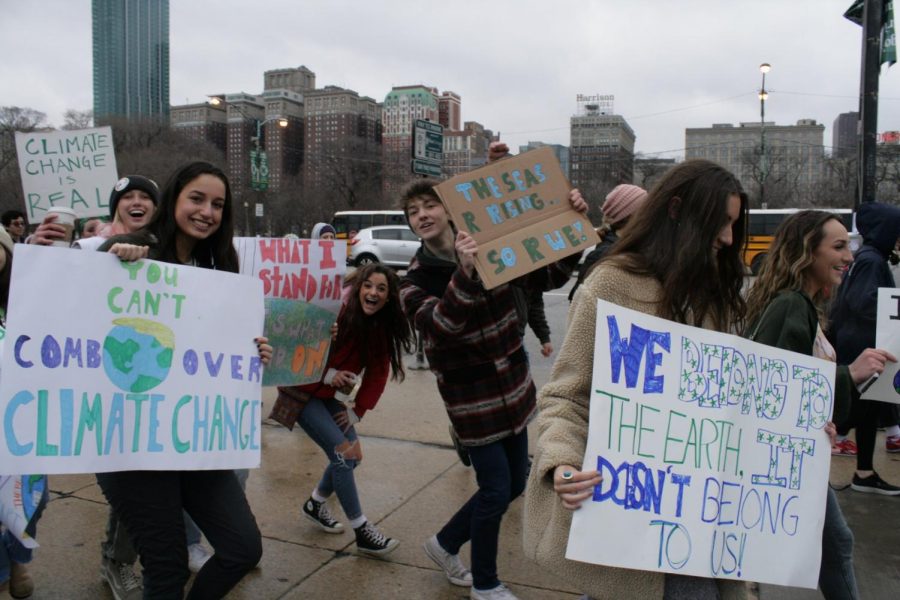High schoolers strike against climate change inaction
More than 100 NT students missed classes to attend global protest
Friday Mar. 15th, many NT students missed school to join several hundred other Chicago area students downtown to protest climate change inaction as part of the Global Youth Climate Strike taking place that day.
The Chicago demonstration, held in conjunction with 2,000 other protests in more than 100 countries, was inspired by Greta Thunberg, a teenage activist in Sweden who began protesting outside of the country’s parliament building in response to climate change inaction.
“It was amazing to see how many people showed up,” said junior Aidan Lane, who helped organize the march. Initially unsure about how many students would skip school, he said, “when we started marching from Grant Park around 11am, I looked behind me and was overwhelmed with how many people were there.”
He described the feeling of not being able to tell what zip code anyone was from or what school they went to. Everyone put one foot in front of the other for the same cause.
Members of Environmental Club talked about striking like Thunberg even before news of the Global Youth Climate Strike circulated. When it was officially announced, Lane sought involvement with the organizing process by helping find speakers for the event and conducting outreach.
Prohibited by NT admin from telling students to attend the strike through formal advertising methods such as posters, Lane and Environmental Club conducted all outreach through social media, word of mouth, and by creating a GroupMe that eventually contained 133 members to spread information.
Senior and president of Environmental Club, Stella Cook, said, “I can’t vote yet and neither can most of the students attending this strike. But I think we need major change, so this is how I’m making my voice heard.”
Cook echoed similar sentiments voiced by students protesting gun violence activism this past year. Both circumstances have proven to galvanized youth who want to passionately speak out yet are limited by their age.
“All of us who showed up know we don’t have a lot of time. And even though we can’t vote, we have a lot of power in organizing and showing up for things that are important to us,” said senior and Environmental Club member Pallavi Simhambhatla.
At the march, Lane and Simhambhatla were two of a succession of student speakers who read their speeches from an elevated platform above the eager throng of young protesters. Lane’s speech issued a call to action, urging the mobilized crowd before him to continue taking action after the strike.
Simhambhatla, who is a member of Girl Up in addition to Environmental Club, gave a speech discussing the intersection of climate change and women’s issues, mentioning that educating young girls around the world and encouraging them to pursue science will be crucial in innovating for more climate solutions.
Many of the speeches emphasized the connections between climate change and other global issues such as hunger, racism, classism, poverty, and corporatism.
Organizers of Friday’s rally called on Illinois lawmakers to support a new bill that would transition the state to 100 percent renewable energy by 2050.
Numerous Illinois politicians including lame-duck Chicago mayor Rahm Emanuel and Governor J.B. Pritzker have promised to transform the Chicago area and Illinois to 100 percent clean, renewable energy.
But there has been less unity at the federal level, where the “Green New Deal,” an ambitious call-to-arms has been hotly debated in congress. Youth activists said they will be petitioning members of Congress to support the House resolution that calls for the country to become carbon neutral by 2030.
“This is the biggest and most urgent issue our generation will face,” said senior German exchange student Nilas Schneekloth.
“This is not my mother country, neither is this my true school, but this problem is international, so as the next generation, it’s our responsibility to take action.”
He noted that in the months he’s spent in the US, he’s observed that environmental activism is much less important to the general population than it is to the German public. Strikes like the one Friday occur much more frequently and he and his friends participated often.
Junior Rachel Glucksman isn’t sure if policies will change after the strike but argued that the march’s purpose in the first place wasn’t to sign bills into law. That’s the privilege of elected officials.
“The most important thing is that we bring attention to the issue and make sure our government know what we want them to do,” Glucksman said.
“It’s definitely extreme for Greta to say she’s not studying for her future because there won’t be one, but I think this issue needs that sense of urgency for change to happen.”
Lane said, “It’s really important for people to know that we’ll continue to do strikes on a smaller scale that everyone can get involved in from NT if they couldn’t make this one.”







































